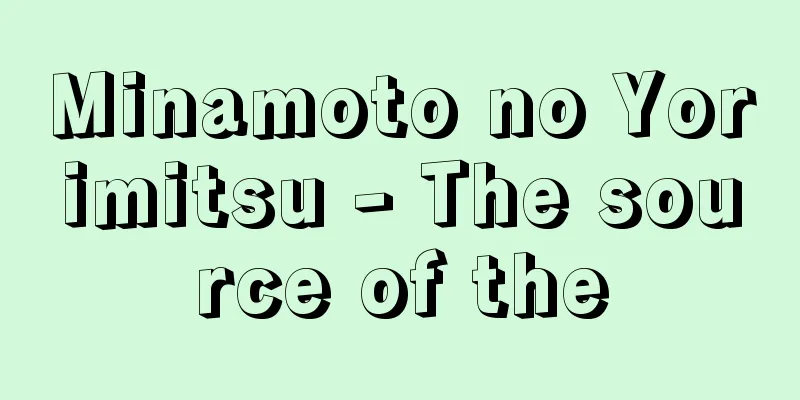Foreign words - Gairaigo

|
Foreign words that have entered the Japanese language. Although kanji (Chinese characters) that entered the Japanese language were originally foreign words, in Japan the term mainly refers to words that have entered the Japanese language from European languages. [Toshio Ishiwata] Foreign words and translationsThere are two ways to introduce words from foreign languages. One is to introduce the foreign word form into Japanese. The English word "information" is introduced in the form of "information," which is a foreign word (often written in katakana). The other is to translate the meaning of the foreign word into Japanese, which is called a "translation." The translation of "information" is "joho." [Toshio Ishiwata] Motivations for adopting foreign wordsThere are two main types: (1) When introducing new things or new ideas. When introducing new things such as highways, cash dispensers (bank cash machines), or ideas such as plate tectonics (sea-floor spreading theory) and recycling (recycling of industrial waste), the terms that go along with them are introduced. This type of term is often found in specialized fields such as natural science, social science, fashion, and sports. (2) When trying to give something a new feel to something that has existed for a long time. For example, young people are called "young," luxurious things are called "deluxe," and house building is called "housing." In the early Meiji period, something like "ai-biki" was expressed as "rendez-vous" in the early Showa period, which changed to "date" after the war. Things can be updated one after another in search of a new feel. [Toshio Ishiwata] History of foreign wordsSome words were introduced from Portuguese in the late Middle Ages (christão, padre, raxa, tabaco, etc.), and some from Dutch during the Edo period (doek, glas, gas, alcohol, etc.), but the majority of foreign words were introduced after the Meiji period. Among them, German is concentrated in fields such as medicine (gauze, neurose) and philosophy (Aufheben, Sein), French in clothing and beauty (chemise, rouge), art (dessin, genre), and Italian in music (alto, finale). The majority of foreign words come from English, and English-related foreign words account for more than 80% of modern foreign words, and are used widely and without bias in any field. [Toshio Ishiwata] Differences between loan words and their original languageWhen foreign words are adapted into Japanese, there are often discrepancies with the original word. Pronunciations are adapted to Japanese, and some phonetic distinctions in the foreign language are lost. Right and light both become "light." Some words are abbreviated, such as "mass communication" and "inflation." Sometimes words that do not exist in the foreign language are created, such as "backstop" (in English), "fancy cake" (in English), and "ticket agency" (in English). Sometimes the meaning shifts. Covers for furniture and other items are the same in both Japanese and English, but while in English "cover" means the cover of a book, "cover" in Japanese means something that covers the cover (in English it is called a jacket or wrapper). These discrepancies can be an obstacle when learning or using a foreign language. [Toshio Ishiwata] "Studies on Japanese Foreign Words" by Umegaki Minoru (1963, Kenkyusha)" ▽ "Kadokawa Foreign Word Dictionary, 2nd Edition, by Arakawa and Sobee (1977, Kadokawa Shoten)" ▽ "The Etymology of Foreign Words" by Yoshizawa Norio and Ishiwata Toshio (1979, Kadokawa Shoten)" [References] | [Supplementary information] |Source: Shogakukan Encyclopedia Nipponica About Encyclopedia Nipponica Information | Legend |
|
日本語のなかに入ってきた外国語の単語。中国語から入った漢語も本来は外来語であるが、日本では主としてヨーロッパ語から入ったものをさしていう。 [石綿敏雄] 外来語と訳語外国語の単語を取り入れるとき、二つの方法がある。一つは、外国語の語形を日本語のなかに入れたものである。英語のinformationをインフォメーションの形で取り入れるもので、これが外来語である(カタカナで表記するものが多い)。もう一つは、外国語の意味を日本語に訳すもので、訳語とよばれる。informationの訳語は「情報」である。 [石綿敏雄] 外来語を取り入れる動機おもなものは次の2種である。(1)新しい事物や新しい考え方を取り入れるとき。ハイウェーhighway、キャッシュ・ディスペンサーcash dispenser(銀行の現金自動支払機)などの新しい事物や、プレートテクトニクスplate tectonics(海洋底拡大説)、リサイクリングrecycling(産業廃棄物の資源再利用)のような考え方を取り入れるとき、それに伴って用語を取り入れるものである。この類には、自然科学、社会科学、服飾、スポーツなどの専門分野の用語が多い。(2)物は古くからあるが、新しい感じをもたせようとするとき。若い人をヤングyoung、豪華なことをデラックスdeluxe、家づくりをハウジングhousingというなど。明治初年に「あいびき」といったものを、昭和初年にランデブーrendez-vousと表現し、戦後デートdateに変わった。新しい感じを求めて次から次へと更新されることがある。 [石綿敏雄] 外来語の歴史中世の末期にポルトガル語から入ったもの(キリシタンchristão、バテレンpadre、ラシャraxa、タバコtabacoなど)、江戸時代にオランダ語から入ったもの(ズックdoek、ガラスglas、ガスgas、アルコールalcoholなど)もあるが、外来語の大部分は明治以後に入っている。そのうち、ドイツ語は医学(ガーゼGaze、ノイローゼNeurose)、哲学(アウフヘーベンAufheben、ザインSein)などの分野、フランス語は服飾・美容(シュミーズchemise、ルージュrouge)、芸術(デッサンdessin、ジャンルgenre)、イタリア語は音楽(アルトalto、フィナーレfinale)などの分野に偏在する。外来語の大部分は英語からきたもので、英語系の外来語は現代の外来語の80%以上を占め、分野的にも偏りなく広く用いられている。 [石綿敏雄] 外来語と原語のずれ外来語が日本語化するとき、原語との間にずれが生ずることが多い。発音は日本語化され、外国語での発音上の区別が失われるものがある。right(右)とlight(照明)はともにライトになる。マスコミmass communication、インフレinflationなど、語形を省略したものもある。バックネット(英語でbackstop)、デコレーションケーキ(英語でfancy cake)、プレイガイド(英語でticket agency)など、外国語にないことばをつくることもある。意味がずれることもある。家具などのカバーは日本語でも英語でも共通だが、英語で本のcoverは表紙を意味するのに対し、日本語のカバーは表紙を覆うもの(英語ではjacket, wrapper)をいう。これらのずれは外国語学習や外国語使用時に妨げとなることがある。 [石綿敏雄] 『楳垣実著『日本外来語の研究』(1963・研究社)』▽『あらかわ・そおべえ著『角川外来語辞典』第2版(1977・角川書店)』▽『吉沢典男・石綿敏雄著『外来語の語源』(1979・角川書店)』 [参照項目] | [補完資料] |出典 小学館 日本大百科全書(ニッポニカ)日本大百科全書(ニッポニカ)について 情報 | 凡例 |
>>: Foreign river - Gairaikasen
Recommend
Tanichthys albonubes (English spelling)
...They feel more comfortable if you plant lots o...
Unter den Linden - Unter den Linden
... The man who put an end to this stagnation was...
Henryk Walezy
…The knowledge of Polish law and customs he gaine...
Galaction, G. - Galaction
…Official name: Romania Area: 237,500 km2 Populat...
Precision casting - Seimitsuchuzo (English spelling) precision casting
A method of producing castings with much higher di...
ALCOA - Alcoa
A common name for Aluminum Co. of America. The lar...
Anpan (architecture) - Anpan
… [Housing composition] The main rooms that make ...
Horse-drawn bird - Horse-drawn bird
…An animal phylum within the invertebrates. It is...
Alkylketene dimer
…To prevent deterioration of the paper, the paper...
Mr. Onodera - Onodera Uji
A group of warriors from the Middle Ages. Their an...
Algerian War
The Algerian National Liberation Front (FLN) foug...
Monkey shrimp (Trachypenaeus curvirostris)
This coastal shrimp belongs to the family Penaeida...
Larva - larva
This refers to the period from when an insect hat...
Inertial navigation
A navigation method that uses a computer to calcul...
Strix uralensis (English spelling) Strixuralensis
…Of these, six species breed: the Great Horned Ow...






![Naganohara [town] - Naganohara](/upload/images/67cc6440adeb6.webp)


